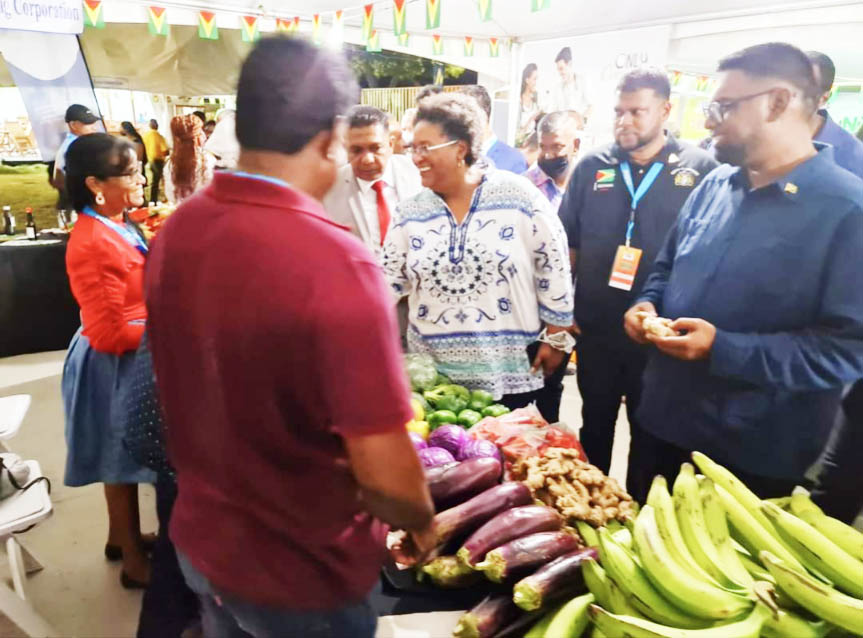2022 will probably be remembered as the year in which the Caribbean sought to make what, arguably, have been the most definitive collective steps in its history to focus regional and international on the transformative capabilities of the region’s agricultural sector, even as the more global threat of climate change and, more recently, indications of a food emergency have emerged. All things considered the international community now has no choice to see the global food insecurity situation from what is really is. We have arrived at a condition in which the world, as a whole, is palpably unable to feed itself.
Up until now concerns over a global food crisis had never, even remotely, extended to the Caribbean where most countries, in a region with a decidedly modest population, have, to varying degrees, been involved in agriculture.
Historically regarded as the ‘bread basket’ of the Caribbean, Guyana’s robust agricultural sector has served, largely, as a ‘cover’ for much of the rest of the region on account of the volumes of products like rice and vegetables which the country produces. In effect, quick and relatively easy access to adequate supplies of foods cultivated and/or manufactured in the region has never, up until relatively recently, been a problem.
Nor did the Caribbean appear, over the years, to pay a great deal of attention to the incremental role which climate change has been playing in further compromising what, in the instances of many countries in the region, were already substantively limited agricultural sectors.
Up until now, the Caribbean has tended, mostly, to ‘talk around’ the issue of food security. After all, it was not as though – as in the famine-ravaged regions of Asia and Africa – the issue of food availability has been, even remotely, a ‘big deal’ here in the Caribbean.
Nor was it a matter of it never having dawned on the region that global circumstances dictated that it seek to continually ‘upgrade’ its food security bona fides in a world where earth-shattering episodes of famine and its consequences were emerging with increasing regularity. Here, it is more than worth repeating that the regional proclivity for palaver and prevarication over important issues – food security being one of those – helped to create a condition of indifference to the food sector as a whole, a tendency that has been attended by repeated failure to carry through with commitments that had been agreed to and which were considered to be important to the realization of regional food security.
Over time, some things have change. First, as a region, the Caribbean appeared to have been be paying increasingly less attention to maximizing its own food production, the heavy dependence of the economies of many of the countries in the region on tourism dictating their food (imported) availability priorities. Here, it should be stated that, it is felt in some quarters that Guyana, long considered to be the ‘bread basket’ of the region, failed to give effective leadership to the Caribbean’s efforts to enhance its food security bona fides.
Two events earlier this year sought to refocus the Caribbean’s attention on its food security vulnerabilities and of the need to burnish its credentials. The first was the May 19-21 Agriculture Investment Forum and Expo in Georgetown and the second was the May 28-29 Agro Fest, Barbados’ National Agricultural Festival.
Not only did these two events serve to attract the highest ever level of collective Heads-of-Government attention to the issue of regional food security in recent memory, they also kick-started what now appears to be a ‘plan’ of sorts – spearheaded by Guyana and Barbados – to develop a regional food security infrastructure that embodies a pooling of resources to develop capacities in the areas of both food production and food distribution across the region. One of the more talked-about developments to derive from this year’s regional ‘food focus’ has been the undertaking at the level of the Caribbean Community (CARICOM) to seek to strengthen the food security bona fides of the region by agreeing on year 2025 as a timeline for a 25% reduction in extra-regional food imports. If this undertaking faces a constraint, however, it is the reality that it may well have now become a prisoner of that well-rehearsed reputation which CARICOM member countries have acquired for false promises.
There are small signs, however, that the worm may be turning – perhaps being forced to turn may be a more appropriate expression here. News emerged just weeks ago of a revelation in the latest round of the Caribbean Community Food Security and Livelihoods Survey which revealed that the number of Caribbean people now facing “moderate to severe levels of food insecurity” now stand at 4.1 million, a revelation that is as shocking as it is profoundly embarrassing for a region renowned for ‘mouthing off’ about its food security credentials.
Now that the game is up the question is where does the Caribbean now go from here with entrenched its protracted food security charade?






